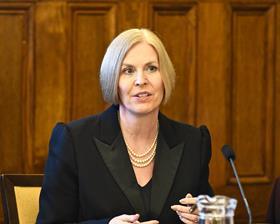Digitising the divorce application process and hoping for the best isn't enough to reform the legal requirements for splitting up, the Law Society has warned, telling the government to restore legal aid so that separating couples can receive early advice.
Lord chancellor David Gauke pledged to remove the 'archaic requirements' to allege fault when his department began consulting on reforming divorce laws. The consultation ended yesterday. The Society, in its response, says it strongly supports this move. However, it says questions around the length of the divorce process and the two-stage decree process are more difficult to answer.
The Society thinks the government should consult further on the length of the process, 'particularly given the changes being made to the court process through the [HM Courts & Tribunals Service] reform programme.'
It says the divorce process 'cannot simply be understood through the lens of how long it takes parties to reach decree nisi or absolute'. Divorcing couples 'must be supported and empowered to understand their financial responsibilities to each other, and any children of the relationship, as well as supported to focus their minds on the best interest of those children. It is simply not enough to move the application process online and hope for the best. We therefore strongly recommend the reintroduction of legal aid for early advice for separating couples'.

Christina Blacklaws, president of the Society, said: 'Cuts to legal aid failed to recognise that solicitors providing early advice were a significant source of referrals to mediation - avoiding costly court hearings. We believe that without early advice from a solicitor, many people do not know that the option of mediation exists, or how to access it. Reforms to divorce law need to come at the same time as the reintroduction of legal aid for early advice.'
Blacklaws said: 'At an emotionally traumatic time such as divorce or separation, parents want and need legal support in order to put the best interests of their children first. It is essential that couples are supported throughout the process. Family law is one area where early advice actually saves money. It can help resolve problems sooner and prevent some legal issues from escalating into costly court cases.'
The government is told to carefully consider the impact of its reforms on communities where fault or blame is required for a religious divorce.
The Society welcomes the proposal to allow parties to issue a joint petition, but warns that this may cause further confusion. For instance, how would court documents refer to the parties, who are currently labelled as 'petitioner' or 'respondent'.
Imposing a minimum wait before a divorce is finalised could help 'reactive' spouses. The Society suggests six months.
The government is also asked to consider the possibility that digitising the divorce process could 'weaponise' it. The Society says: 'A heated, but normal, spousal argument could lead to an online issue of divorce even just moments later.'
Private Client Section: cross border conference 2019, SRA Competence: A2, 7 March 2019, Chancery Lane London
The 2019 Cross border conference will help you to keep on top of the increasingly complex and changing environment of international private client work. We are delighted to announce that this year’s keynote address will be delivered by Richard Frimston, consultant, Russell-Cooke. Richard will be joined by a range of expert speakers from various jurisdictions working within the private client cross border world. Topics include investing in the UK post-Brexit, competitive destinations for HNWI, the new EU matrimonial property and civil partnerships regulations and panels sessions on the process of European probate succession. Take advantage of our early booking rates until 31 January.



























2 Readers' comments